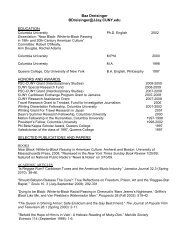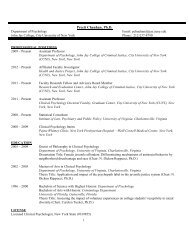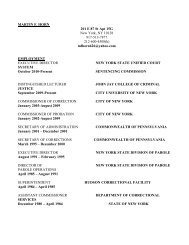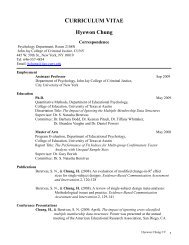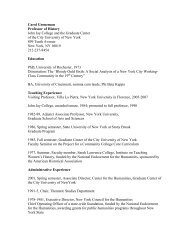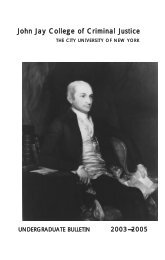Bulletin - John Jay College Of Criminal Justice - CUNY
Bulletin - John Jay College Of Criminal Justice - CUNY
Bulletin - John Jay College Of Criminal Justice - CUNY
You also want an ePaper? Increase the reach of your titles
YUMPU automatically turns print PDFs into web optimized ePapers that Google loves.
Certificates, Programs and Minors<br />
Counseling 3XX Work, Vocational Development, and Social <strong>Justice</strong><br />
in Human Service<br />
Interdisciplinary Studies Program (ISP) - A designated number of<br />
interdisciplinary studies courses can be used to complete<br />
requirements when appropriate to the topic of Human Service<br />
Contact the ISP Department (Room 433T) for details about courses,<br />
and consult with the Human Service Minor coordinator before<br />
registering.<br />
Total: 18<br />
HUMANITIES AND JUSTICE MINOR (Interdisciplinary<br />
– see Minor Coordinator)<br />
Description. The Humanities and <strong>Justice</strong> minor offers students the<br />
opportunity to explore fundamental questions about justice from a<br />
humanistic and interdisciplinary perspective. Embedded in history,<br />
literature, and philosophy, the minor engages students in the study of<br />
constructions of justice that underlie social policy and criminal<br />
justice as well as in broader issues of morality and equity.<br />
Rationale. The Humanities and <strong>Justice</strong> minor will provide students<br />
who are majoring in the social sciences and sciences with an<br />
important supplementary perspective for their study of issues,<br />
policies, and laws concerned with justice. With its interdisciplinary<br />
focus, the minor will also enrich the curriculum of students majoring<br />
in one of the humanities. Its courses are designed to help students<br />
develop the skills of careful reading, critical thinking, and clear<br />
writing that are necessary for careers in law, public policy, civil<br />
service, and teaching.<br />
Minor coordinator. Professor Bettina Carbonell, Department of<br />
English (212.237.8702, bcarbonell@jjay.cuny.edu)<br />
Requirements. The minor in Humanities and <strong>Justice</strong> requires a total<br />
of 18 credits of which 6 credits are required and 12 credits are<br />
electives.<br />
Credits<br />
Required Subtotal: 6<br />
Humanities and <strong>Justice</strong> 250 <strong>Justice</strong> in the Western Traditions<br />
Humanities and <strong>Justice</strong> 310 Comparative Perspectives on <strong>Justice</strong><br />
This two-course sequence provides an introduction to a consideration<br />
of "justice" as a personal, social, and political construction. Selected<br />
texts from history, literature, and philosophy introduce students to the<br />
complexities attending the meanings of justice from ancient to<br />
modern times. Issues under study may include retribution and<br />
revenge; justice as political and social equity; determinism, free will,<br />
and the "unjust" act; divinity, hierarchy, and community as perceived<br />
sources of justice (or injustice); the social construction of justice,<br />
injustice, and crime; law as a structure of rules representing, defining,<br />
and shaping justice. The sequence will explore how understandings<br />
of justice clarify the ethical and legal frameworks defining religion,<br />
the state, colonialism and national identity, race and ethnicity,<br />
gender, ruling, class, the family, and similar structures.<br />
Students in HJS 250 study works concerned with justice in the<br />
western tradition (primarily historical, literary, and philosophical<br />
texts of Europe, Britain, and North America). With its focus on works<br />
from the Mideast, Africa, Asia, and the other Americas, HJS 310<br />
expands student understandings of justice. It encourages comparative<br />
assessments between western and nonwestern forms of justice by<br />
studying contacts resulting from war and conquest, trade, and cultural<br />
exchange. HJS 310 also develops and extends the skills students have<br />
gained in HJS 250 by its comparative tasks, by supplementing<br />
primary texts with theoretical readings, and by more complex and<br />
lengthy writing assignments.<br />
Electives Subtotal: 12<br />
Students must take four courses in literature, history, and/or<br />
philosophy selected from the humanities electives offered each<br />
semester that count toward the Humanities and <strong>Justice</strong> major. At least<br />
two of these courses must be at the 300 level or above. Students will<br />
select their electives in consultation with the minor coordinator.<br />
192



